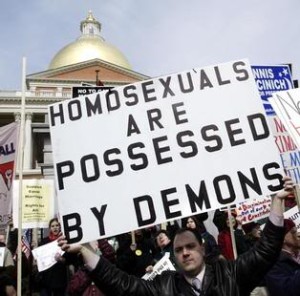Last Updated on 2022-07-08 by Joop Beris
People in the Netherlands or in many other places in Europe aren’t very much taken aback when you tell them you don’t believe in God or that you don’t have faith. It’s not all that uncommon here, fortunately. There are some that raise an eyebrow when you announce that you are an atheist. Somehow using a proper term for disbelief in god, suddenly adds gravity to the announcement. If there’s a real word for it, it must be something serious. However, telling them that you are not just an atheist but an anti-theist, that usually provokes a question. Let me explain why vocal anti-theism matters.
How can you have anything against belief in God or against religion?
To me, the person asking that question is demonstrating an impressive amount of ignorance concerning the nature of faith and organised religion. He or she is under the impression that faith is innocuous and that organised religion may be quaint or obsolete but otherwise mostly harmless. He or she could not be more mistaken.
To clarify, let’s take a quick look at what the difference between atheism and anti-theism is. Atheism means the rejection of belief in any deity. People who are atheists go through life as if no gods exist. That doesn’t mean they don’t have strong feelings on the subject of deities, some may have, some may be indifferent to the idea.
Anti-theism is a more pronounced position because it requires something extra. It requires the notion that belief in a deity is harmful, not just to the believer but also harmful to the society in which the believer lives and to humanity as a whole. For this reason, religion should be countered or fought. Just as the theist promotes his or her faith, the anti-theist speaks out against faith, often ridiculing it in the process. Anti-theists generally hope that humanity will abandon faith and substitute it with reason, logic and science as being much more worthy pursuits.
On this blog, I have written a series of posts that explain why I turned from having faith to becoming an atheist. However, I find myself leaning more and more towards anti-theistic atheism. The more I learn about religion in its many forms, the more I am convinced a genuine case can be made for religion being dangerous. I’m not just referring to the rather obvious examples of suicide bombing, attacking abortion clinics or terrorism. The real danger is far more insidious and closer to home. While most of us will hopefully go through life without ever coming close to religiously motivated terrorists, I am sure that nearly all of us have come across some harmful effect of religion on society. For a fantastic analysis of why religion is bad for humanity, I highly recommend people read Christopher Hitchens’ book entitled “God is not great” for a much more in depth and better analysis than I could ever hope to write here.
For a quick understanding and for those who for some reason may wish to forego this excellent book, one need only turn on the TV, look on a news site online or read a newspaper. The news is awash with negative things happening that are either overtly or surreptitiously religious in nature or at the very least inspired by it. Everything from the latest string of brutal murders perpetrated by IS to Christians protesting gay marriage or the horror that is religious slaughter (warning: video behind this link is graphic and disturbing!).
There are Christians campaigning for the teaching of creationism in schools, under the motto “teach the controversy”, presumably between creationism and evolution. No such controversy exists. Under the guise of religious freedom, priests, imams and rabbis are allowed to preach things that would otherwise be classified as hate speech. Genital mutilation of both boys and girls is condoned because it usually has its roots in religion. The Roman Catholic Church in Africa still speaks against the use of condoms despite the fact that lack of condom use is contributing directly to the spread of AIDS and other sexually transmitted diseases, not to mention unwanted pregnancy. The same church is still harbouring priests who are suspected of sexual and/or physical abuse of minors instead of cooperating with law enforcement. Consider also that a majority of US voters wouldn’t vote for a president who is an atheist. In practice that means that the office that has at its disposal the most powerful military in the world, can realistically only be held by someone who professes to believe in ancient myth at the moment. That’s a scary thought! In many religious communities, women are still treated as inferior to men. While I’m sure the image of veiled women comes to mind, this is not just true for Islam. Christianity is also guilty of this, though less openly than their Muslim brothers.
For the reasons mentioned above and many more, I think it is important that people of no faith, people who consider themselves to be atheists and anti-theists, speak up and make their objections known. It is high time that we reject the notion that because someone has sincerely held beliefs, these beliefs are somehow immune from criticism. No matter how sincere someone may be, by sincerity alone you can not make faith truth. Matters such as animal welfare, human rights and dignity, free speech and freedom from persecution are much too important to be influenced by ancient myths.
If someone wants to speak out against gay marriage, against the teaching of evolution theory in schools or for halal meat, by all means they should be allowed to do so. However, they should not be allowed to do it under the protective umbrella of religious freedom. When asked about why they oppose gay marriage, they should not be allowed to get away with the argument that “God has said so and so”. An argument such as that has no place in rational discourse. Replace the word ‘God’ with ‘Zeus’ or ‘Mickey Mouse’ and you’ll see why this is so.
It is for people like me, people who do not subscribe to any faith or religion, to be the voice of reason. In order to be that voice, we have to discard timidity and reservations when it comes to asking hard questions. Feel free to ask people why they know something to be true or false. Should the answer turn out to be a holy text or any other form of revealed wisdom, by all means reject such ‘knowledge’. Don’t be afraid to point out that their beliefs are just that and nothing more. This may very well offend some people or make them otherwise uncomfortable. Rather like pulling off a band-aid, isn’t it better to get it over with quickly rather than agonizingly picking at the edge and tugging it off millimetre by millimetre? Or as Daniel Dennett puts it: ”There is no polite way to suggest to someone that they have devoted their life to a folly”.



[…] fulfilling and moral life while not believing in ancient superstitions, remains vitally important. Vocal anti-theism continues to matter. Services like those offered by the Agatan foundation (and this modest blog, perhaps) are very […]
[…] Silverman’s writing style is direct, humorous and easy to read, making his book very accessible. You get the feeling that he means the things he says and get a sense of the passion and the anger that drive him. I have to admit that his firebrand style appeals to me because I agree that it is necessary to speak out against unreasonable beliefs. […]
[…] Of course, “New Atheism” isn’t an actual thing. Or rather, it isn’t something new or radically different from “traditional atheism”. It’s just that with the fear for oppression and persecution lifted, society in most modern countries becoming more secular and the Internet giving a voice to many people, the voice of atheism is heard more often. And that is a good thing, in my opinion. […]
[…] I’ve mentioned before that I think religion is harmful. Among other things, it acts as a perception filter that shields the believer from reality but it also makes it difficult to see things in the light of reason. This is illustrated very well in this blog post by Ken Ham, of Answers in Genesis fame. […]